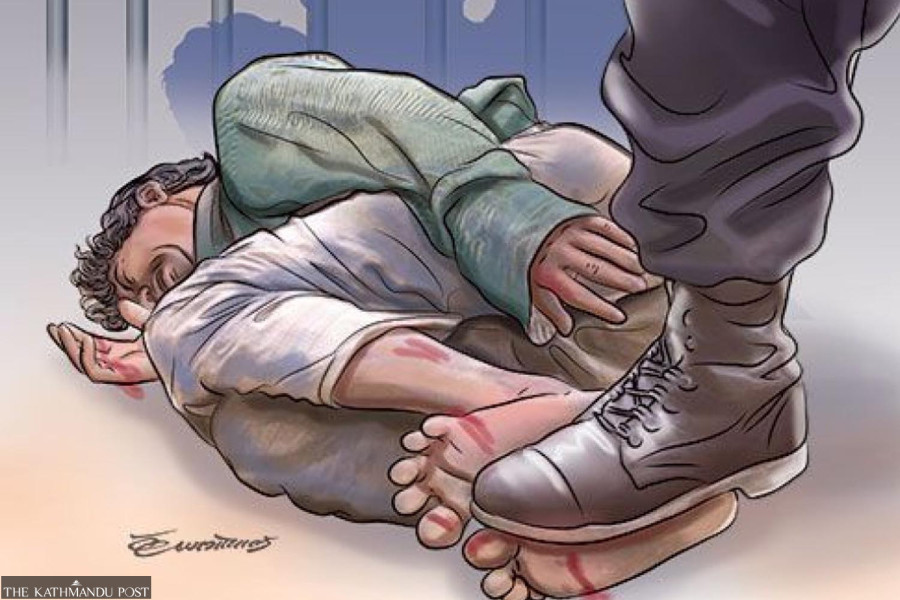National
Custodial deaths go on as perpetrators are left unpunished
Advocacy Forum’s 2022 report documents 39 deaths since 2018 when the new Penal Code came into force.
Binod Ghimire
On August 9, two inmates of the Sankhuwasabha prison succumbed to injuries after they were thrashed by the police personnel guarding them and other prisoners. Binod Tolagni, 19, from the district headquarters, Khandbari, and Akash Balami, 28, from Kakani of Nuwakot district, who were serving their terms, were pronounced dead at a local hospital.
A study by the Informal Sector Service Centre (Insec), a non-governmental organisation working in rights advocacy, suggested that the two were beaten to death by prison guards after a failed attempt to flee the prison. On August 9, the two broke the cell window but were caught by the police before they could escape. The police and fellow inmates beat them indiscriminately, according to the report. According to the report, residents of the settlements near the jail had heard their screams.
A separate government probe, too, has drawn a similar conclusion. The Department of Prison Management probe suggests that at least 12 people, including the police personnel deployed under the command of Assistant Sub-inspector Laxmi Chaudhary, were involved in the beating. Though two of the prison staff, Indra Narayan Yadav and Dhak Lal Karki, have been arrested, further action is yet to be taken.
On August 20, Kamal Basnet, 18, in the Bhaktapur-based juvenile correction centre died under mysterious circumstances. Basnet, who hails from ward 3 of Manthali Municipality of Ramechhap district and had been suffering from fever, was rushed to the nearby Nagarik Hospital after being found unconscious. Another study by Insec blames the authorities’ negligence in the treatment of Basnet for his death.
After a preliminary investigation, the National Human Rights Commission found the deaths—both in Sankhuwasabha and Bhaktapur—suspicious. “It is possible that the inmates in Sankhuwasabha died due to torture, while the death in Bhaktapur also does not look natural,” Murari Kharel, acting secretary at the commission, told the Post. “We are studying both the incidents thoroughly.”
Various reports suggest that custodial deaths have been increasing in Nepal, and many are extrajudicial. In its report published in 2022, the Advocacy Forum documented 39 cases of such deaths starting in 2018 when the new Penal Code came into force. Of the total deaths, 16 were reported in police custody, one at the hands of an army officer, 21 in prison, and one at a juvenile correction centre. Though police say suicide is the cause of most deaths, the report points out torture and late or insufficient medical care as the primary causes.
The report also showed that people from marginalised communities were most prone to such deaths. “Marginalised communities remain ever vulnerable to discrimination based on caste and social status at the hands of police,” the report reads. “At least 11 out of 21 deaths in prisons involved detainees from Dalit or other poor communities.” Suicide by hanging is often used as a cover-up for torture or other inhuman treatment in police custody, it adds.
The Advocacy Forum suggested that the government set up an independent monitoring mechanism to properly investigate any incidents of deaths in custody to establish the cause of death and any failures on the part of the authorities involved, and hold those responsible to account. The mechanism should be impartial, independent and effective, ensuring that alleged perpetrators have no influence on the investigation and investigators have no records of being involved in violations, according to the Advocacy Forum.
Bikash Basnet, director at the Advocacy Forum, said the incidents of custodial deaths and extrajudicial killings have continued regularly this year. “The tragedy is that those involved in such crimes are seldom booked,” Basnet told the Post.
As Basnet points out, the government has been reluctant to take action against the officers involved in extrajudicial killings, even in cases that the constitutional human rights commission had investigated.
The commission has concluded that a team led by Deputy Superintendent Rugam Bahadur Kunwar arrested Gopal Tamang, 23, of Sindhupalchok, and Ajay Tamang, 24, of Nuwakot, and shot them dead at Doleshwar jungle in Suryabinayak, Bhaktapur on August 6, 2018. Officers claimed they were killed in “an encounter” as the police had fired at them in self-defence after the duo tried to attack the police personnel searching for Nishan Khadka—an 11-year-old abducted from Kandaghari. But the commission’s investigation found otherwise.
In another investigation, it was found that Kumar Paudel, Sarlahi district in-charge of the Netra Bikram Chand-led Communist Party of Nepal, too, was killed extrajudicially. Though authorities had claimed that he died in police action on June 20, 2019 in Lalbandi of Sarlahi, the commission had found that a police team led by Inspector Krishnadev Prasad Sah had killed Paudel.
The commission had recommended legal action against Sah and senior constables Binod Sah and Satya Narayan Mishra for their involvement in the killing. The commission also asked that a warning be issued to Inspector Kiran Neupane and Sub-inspector Surya Kumar Karki as they gave false reports about Paudel’s killing.
Despite the legal obligations, however, the government hasn’t abided by the recommendations.




 18.12°C Kathmandu
18.12°C Kathmandu














